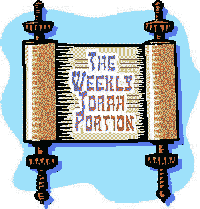Search our Archives:
» Home
» History
» Holidays
» Humor
» Places
» Thought
» Opinion & Society
» Writings
» Customs
» Misc.
|
The Stuff of Survival
By Michael Chessen
At the outset of our reading of V'yigash, Judah takes center stage
as
spokesman for all of his now fully penitent brothers. His eloquent plea
before the man who they still believe to only be the hostile Egyptian
viceroy sublimely expresses the sincerity of all ten brothers' "return"
from the depths of evil intent to the height of brotherly love. Although
Joseph's dramatic revelation of his true identity ultimately shows his
brothers that they had never actually been in the physical danger in
which
they had feared they had, Judah's statement nevertheless retains its
essential value in enabling Joseph to comfort his brothers and tell them
not to be upset with themselves for having sold him into slavery because
"God sent me before you to preserve life."(Genesis 45:5).
Rabbi J. H.
Hertz
sees Judah's performance in the opening section of V'yigash as forming
the
basis for the verse in Jacob's blessing in next week's reading of
V'yechi:
"Judah your brothers will thank you (yoducha)." (Gen. 49:8)
Although Joseph's brothers seem to have fulfilled the three
conditions
which Maimonides sites as constituting complete repentance, namely,
confession, regret and resisting repeating the same sin in a similar
circumstance, Joseph still at least minimally rebukes them by juxtaposing
the revelation of his identity with the question "is my father still
alive?"(Gen. 45:3). This rebuke, which would properly be read as asking
the
brothers if their father was indeed still alive after all that they had
put
him through, was needed in order to abide by the Torah's directive that
one
need necessarily air any possible grievances against one's fellow in
order
to clear the way for fully fulfilling the precept to "love one's fellow
as
one's self". This being disposed of, however, upon sending his brothers
on
their way to bring Jacob and family down to Egypt, Joseph implores them
to
"avoid irritation on the way"(Gen. 45:24). Rather than engaging in
needless
finger-pointing concerning the past, the brothers need to proceed forward
in helping carry out God's will with the joy one needs to feel in
performing any positive commandment from the Torah.
Upon learning that his beloved Joseph is yet alive and rules over
the
land of Egypt, Jacob feels joy which perhaps has had no parallel in all
that he has had to endure over the course of his many years. Whereas he
had
received the new name of "Israel" as an expression of his ability to
spiritually overcome diversity, Rabbi S. R. Hirsch sees Jacob as likely
experiencing a certain tempering of his newly found joy when God here
still
calls out to him not as Israel, but as Jacob, when God tells him not to
fear going down to Egypt. Apparently, to survive the exile, or "galut",
the
Jewish people will still need some of the "bypassing" characteristics
associated with the name "Jacob". However, Jacob's descendants who
accompany him to Egypt are now for the first time called the "children of
Israel". Inherent holiness will help sustain the Jewish people while they
await their desired return to the Holy Land.
Wishing you all a Shabbat Shalom!

|
|
Please let us know if you see something unsavory on the Google Ads and we will have them removed. Email us with the offensive URL (www.something.com)
|





|
